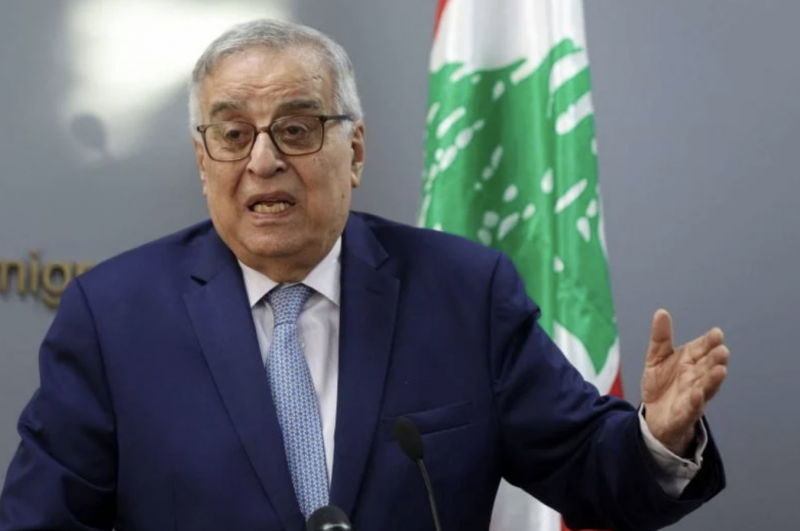
Outgoing Lebanese Foreign Minister Abdallah Bou Habib at a press conference in Beirut, Jan. 6, 2024. (Credit: Mohamed Azakir/Reuters)
In an interview with L'Orient-Le Jour (OLJ), caretaker Lebanese Foreign Minister Abdallah Bou Habib said that “if war breaks out, it won't come from Lebanon,” as Hezbollah and Israel clash along the border amid the Israel-Hamas war.
“What Lebanon wants is the implementation of UN Resolution 1701,” said Bou Habib. He assured that Beirut “wants to negotiate with the Israelis through the United Nations Interim Force in Lebanon (UNIFIL) or other parties, such as the Americans or the French.”
On the sidelines of the Security Council, Bou Habib held talks with UN Secretary-General Antonio Guterres, UN Deputy Secretary-General Rosemary di Carlo, US Assistant Secretary of State Uzra Zeya, as well as with his French, Russian, Turkish and Iranian counterparts, among others.
OLJ: What message did you convey during your bilateral meetings with foreign ministers and UN officials?
Bou Habib: We discussed the situation in Lebanon and passed on our ideas concerning the demarcation of the land border recognized between Lebanon and Palestine in 1923, and the armistice agreement between Israel and Lebanon in 1949, signed in Rhodes under the aegis of the UN.
Today, the UN does not consider the Blue Line to be our border. We therefore want to negotiate with the Israelis, through UNIFIL or others, like the Americans or the French, to define the border line.
This will lead to Israel's withdrawal to its internationally recognized borders, from point B1 and Ras Naqoura [on the coast] to Ghajar, and Israel's withdrawal from Shebaa Farms and the Kfar Shuba Hills, which are Lebanese. Then we'll settle our problem with Syria.
The border between Israel and Lebanon must be demarcated to put an end to this situation. It is also imperative that Israel put an end to its air, land and sea violations.
We also call on the international community to help us strengthen the Lebanese Army, as we need more forces in the south of the country. UN Security Council Resolution 1701 calls for a contingent of 15,000 men in the south. We have less than 5,000. We don't have the means to ensure recruitment, even though demand is very high due to unemployment.
Is the Lebanese state strong enough to conduct negotiations?
We are not weak. Thirteen foreign ministers and the Secretary General of the United Nations asked to meet us [during the visit to New York]. This means that we are present. We are also present at all international forums.
We're there to defend Lebanon's interests, even if our government is only in charge of current affairs. Our government works. That's why we are there and will continue to be there until a new president is elected and a new government is formed.
Why haven't any Arab heads of state visited Lebanon since Oct. 7, 2023?
I don't have an answer to that question. We are in contact with all Arab foreign ministers. We meet at meetings such as those of the Arab League. Lebanon has been without a president for two years, yet heads of state visit the president, their counterpart.
How much leeway does the state have with Hezbollah, and do you hold it to account?
Our relations with Hezbollah are good, even if we don't always agree. I don't report to Hezbollah and I don't answer to them, just as Hezbollah doesn't answer to me.
Hezbollah is the resistance. The slogan “the people, the army and the resistance” was created in 2000, and it appeared in every ministerial statement. It's nothing new. We have no problem with Hezbollah. We talk all the time. Yes, I share a lot of information with the party and vice versa, as I do with the Prime Minister and the Speaker of the House, Nabih Berri.
We have a good relationship. When I get back to Lebanon tomorrow, I'll go and see Hezbollah. I'll inform them of what's happened and of my talks with the international community. They're doing the same, keeping me informed of their meetings.
We're all working in Lebanon's interests, and Hezbollah has an interest in supporting the demarcation of the border and Israel's complete withdrawal from all our occupied territories.
Does this mean that Hezbollah is ready to get rid of its arsenal?
This is a discussion that needs to be conducted collectively.
Hezbollah neither supported nor opposed the negotiations on the maritime border, and they were successful. It will be the same with the demarcation of the land border.
This does not mean that we will impose conditions on Hezbollah. But we can work together in the interests of Lebanon.
What can Lebanon do to escape a war and avoid being dragged into it unwillingly?
If war comes, it won't come from Lebanon. Neither Hezbollah nor the Lebanese government want war. We're talking about defense rather than war.
I've told the international community that if the war spreads, it will be a regional war with forces coming from Syria, Iraq, Yemen, from everywhere. So it's up to Israel to decide whether or not to go to war. What Lebanon wants is the implementation of Resolution 1701.
This article was originally published in L'Orient-Le Jour.